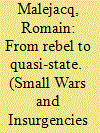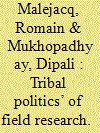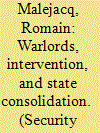| Srl | Item |
| 1 |
ID:
153619


|
|
|
|
|
| Summary/Abstract |
How do warlords build their legitimacy and eventually exert authority? The case of Afghan leader Ahmad Shah Massoud demonstrates that warlords do not only build legitimacy through the internal provision of goods and services to the population under their control, but also build their legitimacy by projecting authority externally, through the development of their own form of diplomacy. In this article, I show that warlords develop complex and complementary legitimisation strategies that extend beyond their territorial realms to include consequential relationships with foreign actors.
|
|
|
|
|
|
|
|
|
|
|
|
|
|
|
|
| 2 |
ID:
179929


|
|
|
|
|
| Summary/Abstract |
The ‘Sahelistan’ discourse that conflates conflict dynamics in Afghanistan and Mali is widespread in Western media and policy circles. We argue that such representations contribute to the adoption of one-size-fits-all conflict management policies. Drawing on extensive fieldwork in both places, we also argue that these standard templates of intervention shape responses from local non-state armed actors, who manipulate foreign interveners for their own (violent) purposes in similar ways. Yet, we show that this convergence in armed group behaviour still manifests itself in important variations in widely different contexts, furthering strongmen autonomy in Afghanistan, while fostering armed group fragmentation in Mali.
|
|
|
|
|
|
|
|
|
|
|
|
|
|
|
|
| 3 |
ID:
150505


|
|
|
|
|
| Summary/Abstract |
Can fieldwork still be done in today’s most violent warzones? We contend that long-held methodological principles about power and impartiality do not hold in today’s conflict-ridden environments. Research of this kind can still be pursued, but only if the scholar’s place is reconceived as one of limited power and unavoidable partiality. We argue that those still able to do fieldwork in sites of increasing danger do so by virtue of building their own ‘tribes,’ forming and joining different social micro-systems to collect data and, in some cases, survive. Field research must, therefore, be recognized as its own form of foreign intervention. In considering the future of political science research in the most challenging war-torn settings, we examine the risks and opportunities that accompany ‘tribal politics’ of this kind and underline the importance of reflecting on our own positionality in the process of knowledge production.
|
|
|
|
|
|
|
|
|
|
|
|
|
|
|
|
| 4 |
ID:
147904


|
|
|
|
|
| Summary/Abstract |
Despite efforts to bolster failed states over the past two decades, many states in the international system still exhibit endemic weakness. External intervention often leads to political instability and in most cases fails to foster state consolidation, instead empowering and creating ties with the ones it aims to weaken. Using the case of Afghanistan, I develop a typology of political orders that explains variation in degrees of state consolidation and provides the basis for more systematic comparative analysis. I demonstrate the resilience of a political logic according to which non-state armed actors (warlords) “shape-shift” and constantly reinvent themselves to adapt to changing political environments. This article, based on extensive field research in Afghanistan, shows why failed states are unlikely to consolidate and exhibit Western-style state building, as a result of intervention or otherwise.
|
|
|
|
|
|
|
|
|
|
|
|
|
|
|
|